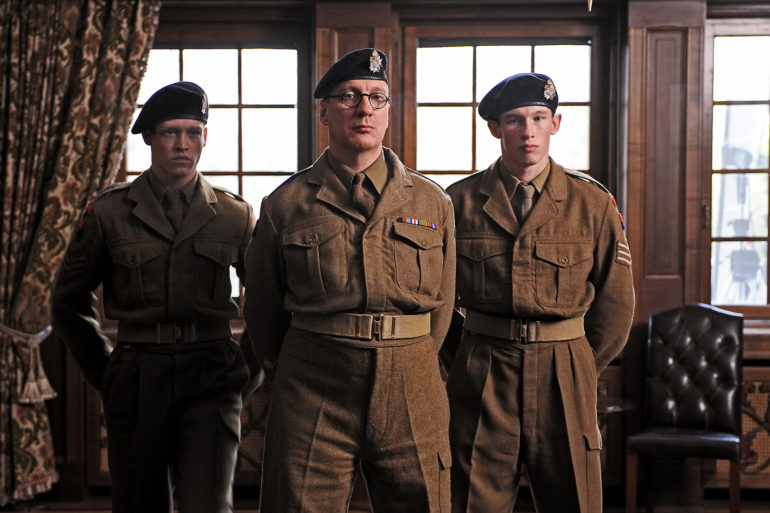At one point in Queen and Country, a character admits to infidelities past and explains them thus: “It was the war. We all did silly things.” With Queen and Country, John Boorman paints a portrait of a country and a family still paying the price for such silly things, war being the silliest of all things, and that family being his own.”
Queen and Country, for all its militaristic trappings, is a largely joyous and gentle affair. It invokes the spirit of its predecessor, Boorman’s 1987 triumph Hope and Glory, not least by opening with that film’s closing scene. Besides sharing characters, both films find the simple pleasures amidst the harshness of militaristic reality. This time around, reality is coloured many shades of green, from the prefabricated army sheds to the hard-wearing uniforms. Amongst the cadets is the young hero of Hope and Glory, Billy Rohan (Callum Turner). Nine years on from his Blitz-scarred childhood, Boorman’s cinematic alter ego has been conscripted, as Her Majesty’s Finest prepare to battle the Red Menace in Korea. Billy trains new recruits in typing, alongside his pal and fellow conscript Percy (Caleb Landry Jones, chewing on his accent). These close friends compliment each other; Billy’s the handsome upstanding chap with a cheeky grin whilst Percy is a perpetual japester, inspired/egged on by another skiver, Pat Shortt’s Pvt. Redmond. Queen and Country is a film about relationships, whether it’s the camaraderie between troops or the flirtations that lead to first romance.
It’s a testament to Boorman’s life that even the most outlandish of events in Queen and Country turn out to be largely true. Billy begins a relationship with Ophelia (Tamsin Egerton), a society girl who enjoys the arrival of this lower-class lad, but gives no hint their liaison will actually go anywhere. We’re keen to see how this unlikely romance will end, if only for Billy’s sake. In his feature debut, Turner is a magnetic leading man, by turns charming, intense and vulnerable. His skills are put to the test by a script that hops back and forth between many plots and moods across its ample 114-minute runtime. Two main plotlines define the scenes at the military base. Billy’s pacifistic opinions and influence see him charged with military sedition, while Percy has stolen a prize clock from the sergeant’s mess, and the camp is turned upside-down in an effort to trace it. Boorman’s script never manages to gel this battle between lighter and darker tones together, thus robbing the film as a whole of a defining throughline. His direction, on the other hand, keeps the film from flitting from the mind entirely. Aided by the film’s production design and cinematography, Boorman creates a definitive sense of place and time. Hope and Glory offered a template for British nostalgia fiction that Terence Davies subsequently perfected. Queen and Country runs by the Davies playbook (detailed design, relatively un-starry casts), but it lacks the backbone of something like Distant Voices, Still Lives.
Billy won’t be posted to Korea, but his battles rage on the home front. Tapping the nostalgia vein for all its worth, the film works best when Billy faces more personal demons. His viewpoints, as exposed by his being court-martialed, lead him into conflict with hard-nosed Sgt. Bradley (David Thewlis, in arguably the film’s best performance), whose own experiences haunt him yet. Meanwhile, his visits to the idyllic family home on the Thames sees gently-boiling issues slowly manifest themselves. Running concurrent with the buildup to Elizabeth II’s coronation, Queen and Country pitches Billy as a symbol of Britain shaking off the burdens of war, to mixed effect. As Billy’s father (David Hayman) warns, “Do not underestimate the power of tradition.” Yet, for something that deals with that stark clash of old and new, Queen and Country is perhaps too idyllic a reflection to wholly grapple with the issue. Still, it’ll doubtlessly make prime Sunday afternoon viewing (accompanied by cake and tea, of course) in years to come. How very old-fashioned.
Read Scannain‘s interview with writer director John Boorman here.

